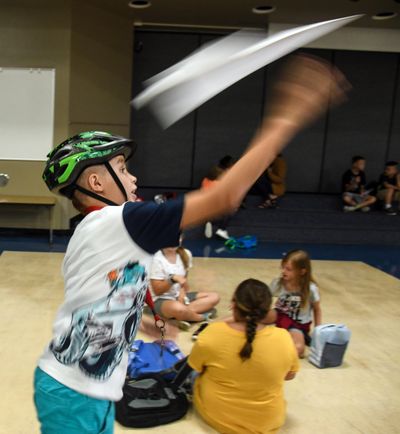Class is out early on Friday in Spokane elementary schools, but students have an option to stay in school

The SHOP was open for business Friday afternoon, and the business was fun.
Moreover, it was safe, stimulating and well-supervised fun.
That isn’t the same thing as class time, but Spokane Public Schools is determined to make the best of a bad budget situation.
At Bemiss Elementary School in northeast Spokane, 35 kids exercised their minds at checkers and Jenga, then stretched their limbs in the gym.
At Sheridan in the East Central neighborhood, about 50 students were engaged in some serious exercise in the gym – “because I know our kids don’t get enough play time,” said Principal Larry Quisano, who was sweating along with them.
Farther up the hill, students at Lincoln Heights were busy on laptops and artwork, because the school day is what you make it.
They’ll do these and other activities on most Fridays for the entire school year at all 34 elementary schools in the district, which opted last spring to save some money by ending the school day 75 minutes early every Friday.
To accommodate families who might not be able to adjust to the early release, the district is offering The SHOP.
While most kids took the bus home at 1:45 p.m., others stayed until 3 at The SHOP, which stands for Snacks, Homework and Organized Play.
On Friday, kids did all of that and more.
Participation varies by school, with an average of 40 to 50, or roughly 10% of the student body.
At some schools, more than 100 signed up. About 35 kids took part at Bemiss, where Principal Rachel Sherwood supervised games, snacks and activities.
“It’s a safe place for kids, and to provide something on early-release Fridays for parents who don’t have the ability to provide supervision,” Sherwood said.
The district pulled out all the stops – or at least pulled many of its senior administrators for the inaugural SHOP. At Bemiss, communications director Brian Coddington passed out name tags and crayons.
Shawn Jordan, the director of secondary schools, watched over the activities at Sheridan, where Quisano upped the fun factor with help from PTA Performance of Spokane, a private firm that specialized in enhancing athletic performance.
As Jordan and Quisano looked on, one of the trainers encouraged the youngsters.
“You’re winning the day!” he shouted, which seemed to have the desired effect, as kids played even harder.
At Lincoln Heights, exercise gave way to study. “The kids seem very engaged – I think we’re off to a great start,” Associate Superintendent Linda McDermott said.
With the benefit of hindsight, they’ll do it again next week and throughout the year, for 20 Fridays total.
However The SHOP will be closed when the district’s middle and high schools have early release.
On those days, all elementary students will leave at 1:45 p.m., and families will have to make other arrangements.
There will be some hiccups. Despite spreading the word on social media and other outlets, the district received plenty of questions from parents.
“Mostly, they wanted more information,” Coddington said.
The early release on Fridays has been controversial since the idea was floated in the wake of the budget crisis that emerged last spring.
As it cut librarians and changed the specialist model at elementary schools, the district was forced to rely on teachers to use their prep time with their classes in the library. Early release Fridays will restore that prep time.
As it turned out, the net savings is only about $1.4 million. By the time the district realized that the savings was that low, hundreds of employees had been moved throughout the district and it was impractical to restore full Fridays.
The biggest loss is 25 fewer instructional hours per year, which leaves elementary schools at 1,050 annually. The state minimum is 1,000 hours.
In the meantime, hundreds of children will fill those hours at The SHOP.
As the SHOP-goers at Bemiss played, several others looked on as they waited for rides home.
“That looks like a lot of fun,” one said.